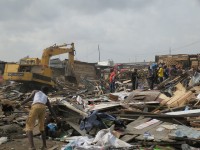A court sentenced a family of four Vietnamese fish farmers to prison terms of two to five years on Friday after finding them guilty of attempted murder for fighting back against a state eviction squad with homemade guns and land mines last year.
Latest news
- France begins eviction of 650 migrants from Calais camps
- Anti-eviction group creates crowdsourcing map for stories of displacement
- More foreclosures, more middle-aged suicides, study finds
- When it comes to hosting the Olympics, more cities are saying, ‘Hold that thought.’
- European leaders urged to end plight of 600,000 stateless people
Latest from the collection
- Raquel Rolnik’s mandate ends. Leilani Farha is the new rapporteur. – Newsletter #47
- Roots and Branches
- New Materials on Security of Tenure in Several Languages – Newsletter #46
- Guide: Guiding principles on security of tenure for the urban poor
- Address acute housing crisis – Special rapporteur on adequate housing
Learn more


